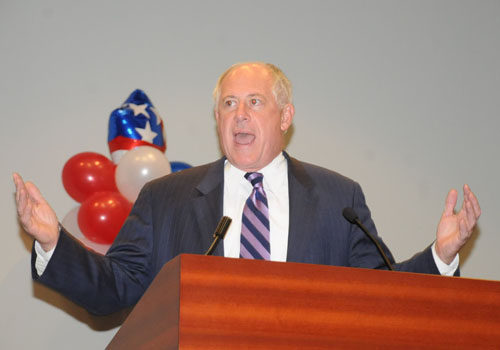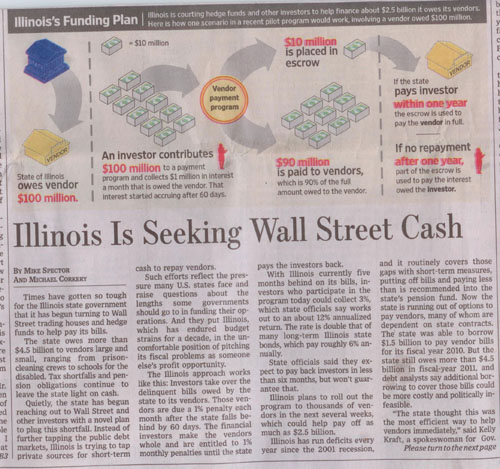More 'creative financing' in Illinois to dodge the revenue challenge... The Wall Street Journal reports state to sell bills to hedge funds as an investment to pay vendors owed billions
Usually, the weekend edition of The Wall Street Journal is distinguished more for its personal sections than its financial news, but a close reader of the December 11, 2010 edition would see that a major problem facing Illinois funding was being addressed — at least in theory — by state leaders behind the scenes in a way that might prove a huge long-term problem, in the attempt to provide a short-term solution. The problem is as close as the recent claims by some Illinois politicians (for example, Chicago mayoral hopeful and former Obama chief of staff Rehm Emmanuel) that Illinois can "cut" its way to fiscal sanity by, once again, cutting expenses. The same story has been echoed by mayoral hopeful Gery Chico.
 Illinois Governor Pat Quinn (above) spoke at the October 29, 2010 LEAD dinner hosted by the Chicago Teachers Union. Substance photo by Sharon Schmidt.But the real problem, as Chicago Teachers Union leaders and others have pointed out (most recently, see the current article here at Substance, at the October 15 Illinois Federation of Teachers convention) is on the revenue side. And every new supposedly creative attempt to bring in dollars without raising actual revenue becomes more controversial.
Illinois Governor Pat Quinn (above) spoke at the October 29, 2010 LEAD dinner hosted by the Chicago Teachers Union. Substance photo by Sharon Schmidt.But the real problem, as Chicago Teachers Union leaders and others have pointed out (most recently, see the current article here at Substance, at the October 15 Illinois Federation of Teachers convention) is on the revenue side. And every new supposedly creative attempt to bring in dollars without raising actual revenue becomes more controversial.
ARTICLE FROM THE DECEMBER 11, 2010 WALL STREET JOURNAL BELOW HERE:
Illinois Seeks Wall Street Cash, State Pitches Plan for Trading Houses and Hedge Funds to Help Pay Its Vendors, By MIKE SPECTOR And MICHAEL CORKERY. —Amy Merrick contributed to this article. Write to Mike Spector at mike.spector@wsj.com and Michael Corkery at michael.corkery@wsj.com
Times have gotten so tough for the Illinois state government that it has begun turning to Wall Street trading houses and hedge funds to help pay its bills.
The state owes more than $4.5 billion to vendors large and small, ranging from prison-cleaning crews to schools for the disabled. Tax shortfalls and pension obligations continue to leave the state light on cash. [The original article available to subscribers on The Wall Street Journal Web site has a slide show Pinched in Illinois and additional photographs and charts].
Quietly, the state has begun reaching out to Wall Street and other investors with a novel plan to plug this shortfall. Instead of further tapping the public debt markets, Illinois is trying to tap private sources for short-term cash to repay vendors.
Such efforts reflect the pressure many U.S. states face and raise questions about the lengths some governments should go to in funding their operations. And they put Illinois, which has endured budget strains for a decade, in the uncomfortable position of pitching its fiscal problems as someone else's profit opportunity.
The Illinois approach works like this: Investors take over the delinquent bills owed by the state to its vendors. Those vendors are due a 1% penalty each month after the state falls behind by 60 days. The financial investors make the vendors whole and are entitled to 1% monthly penalties until the state pays the investors back.
 The article appeared on the front page of the "B" section of The Wall Street Journal on December 11, 2010.With Illinois currently five months behind on its bills, investors who participate in the program today could collect 3%, which state officials say works out to an about 12% annualized return. The rate is double that of many long-term Illinois state bonds, which pay roughly 6% annually.
The article appeared on the front page of the "B" section of The Wall Street Journal on December 11, 2010.With Illinois currently five months behind on its bills, investors who participate in the program today could collect 3%, which state officials say works out to an about 12% annualized return. The rate is double that of many long-term Illinois state bonds, which pay roughly 6% annually.
State officials said they expect to pay back investors in less than six months, but won't guarantee that.
Illinois's Funding Plan
Illinois is courting hedge funds and other investors to help finance about $2.5 billion it owes its vendors. Here is how one scenario in a recent pilot program would work, involving a vendor owed $100 million.
Illinois plans to roll out the program to thousands of vendors in the next several weeks, which could help pay off as much as $2.5 billion.
Illinois has run deficits every year since the 2001 recession, and it routinely covers those gaps with short-term measures, putting off bills and paying less than is recommended into the state's pension fund. Now the state is running out of options to pay vendors, many of whom are dependent on state contracts. The state was able to borrow $1.5 billion to pay vendor bills for its fiscal year 2010. But the state still owes more than $4.5 billion in fiscal-year 2011, and debt analysts say additional borrowing to cover those bills could be more costly and politically infeasible.
"The state thought this was the most efficient way to help vendors immediately," said Kelly Kraft, a spokeswoman for Gov. Pat Quinn's Office.
It is unclear how many large investors have signed up for the program. Total investments haven't been finalized, Ms. Kraft said. The state said a pilot program launched in October made $100 million available to vendors. The program doesn't cost the state any more money than if it paid vendors directly, Ms. Kraft said.
"If vendors who sign up for the program need $100 million or $500 million or $1 billion, we are confident we will have that money," Ms. Kraft added.
Illinois started pitching Wall Street on the program as early as October, noting that many vendors owed money are small and can't afford to wait. A small delegation, including a governor's aide and a Chicago banker, went to New York in October to pitch the program, according to people familiar with the matter. Small Illinois banks, and even an airplane leasing company, also have been briefed on the idea.
The state took its proposal to Goldman Sachs Group Inc., Fortress Investment Group LLC, Deutsche Bank AG, Citigroup Inc. and BlackRock Inc., according to people familiar with the matter. Representatives for the firms either declined to comment or didn't respond to requests for comment.
"This investment is a good risk/reward, and there is some altruism here," said Lowell Kraff, a founding partner at Trivergance LLC, a Chicago merchant bank that is an early investor in the program. In October, the pilot program paid out $310,000 that ultimately went to vendors. Trivergance said it hasn't been paid back yet but expects to be repaid by year end.
At least one prominent New York hedge fund passed on the opportunity, fearing that profiting from a cash-strapped state's taxpayers and small vendors would appear unseemly. Another of its worries: The state mightn't ultimately make good on its promises.
That isn't what the state says. Among the program's main selling points: "Illinois cannot declare bankruptcy and constitutionally must pay its obligations," according to investor materials.
Ms. Kraft said the program was largely inspired by complaints from vendors, who were being solicited to sell their debts at significantly less than face value. Some were being offered as little as 20 cents on the dollar, a person familiar with the matter said.
Youth Service Project, which helps 2,000 children on Chicago's West Side, had to lay off as many as five of its roughly two dozen employees earlier this year because of the state's delay in paying its bills. Kenny Martin-Ocasio, executive director of the group, is concerned about having to disrupt its services to children because of the $100,000 that the state owes it.
Mr. Martin-Ocasio said he welcomes the vendor-assistance program, even if it means investors are profiting on the state's financial woes. "It's the lesser of two evils," he said. "Any remedy to this fiscal illness is welcome."


By: Jim Vail
funny, isn't it?
Funny, the state is going with hat in hand to the very crooks who robbed our nation and needed tax payers (many of whom are now without jobs) money - so they can make even more money off our woes. I see something fundamentally wrong here - the path this country is taking is continuing to lead to the abyss.